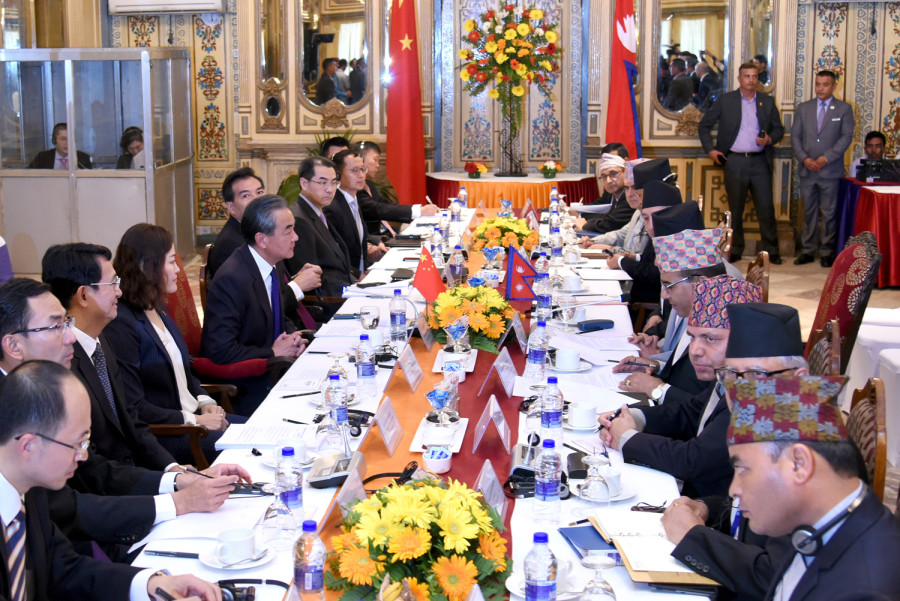Editorial
Is there any takeaway from the Chinese foreign minister's visit?
It seems that all Nepal is capable of getting China to agree to are the agreements themselves.
Chinese State Councillor and Foreign Minister Wang Yi completes his trip to Nepal today. And while the visit of such a high ranking Chinese official is sure to add to the goodwill between Nepal and China, not much else has been achieved by this trip. To be clear, the Chinese never have been keen to make promises they cannot keep. However, the KP Oli government had, prior to Wang's visit, used the opportunity to sell grand dreams and visions to the people. But most of the announcements and exchanges made during the Chinese foreign minister's visit are not new—a majority have been agreed upon beforehand. Moreover, there have been no announcements made yet on the fate of the much-touted projects under the Belt and Road Initiative, which have yet to take off. And finally, even though the Nepali side had been selling this visit as a precursor to Chinese President Xi Jinping's first trip to Nepal, the visiting minister's comments on the matter were non-committal.
Nepali governments, especially the current one, are known to stretch the truth when it comes to reporting on their foreign diplomacy achievements. This is particularly true when it comes to disclosing the timeline of any project, or the stage of discussions any agreements are at. The news that the Chinese side has agreed to fund the Hospital Recovery Project and provide Nepal with emergency shelter tents is not new. Moreover, it is embarrassing that a world power donating 5,000 tents to its immediate neighbour is worthy of so much attention. There seems to be no takeaway from this visit at all. The need for a high-level visit just to agree to past agreements is beyond comprehension. But more importantly, discussions of projects under China's flagship Belt and Road Initiative don't seem to have progressed as desired by the government.
Following India's economic blockade in 2015, the then Oli-led government had vowed to develop closer ties with China. Having signed a trade and transit agreement in 2016, it was hoped that China could provide a significant alternative route for third-country trade, to lessen Nepal's reliance on India as a trade and transit route. After a three-year delay, a Protocol on Implementing the Trade and Transit Agreement was finally signed in April this year, during President Bidhya Devi Bhandari's visit to China. Indian routes continue to handle almost all of Nepal's trade with third countries.
The signing of the Transit Agreement had supposedly heralded a new chapter in Nepal-China ties. Nepal enthusiastically signed up for the Belt and Road Initiative in early 2017. However, two years on, none of the nine projects mutually agreed upon by the two countries have taken off. For Oli, this has included his dream project of a railway connecting sections of Nepal to China. Although Oli has on numerous occasions promised that the railway would be built soon, China has repeatedly elucidated the geographical, engineering and economic challenges that make taking the project forward difficult.
This visit by a high-level Chinese delegate seems to have been a wasted opportunity. Had the government done its homework about what projects China is willing to move forward in haste and been honest to the people about it, the visit would have shown better results. And although Nepal can and should expect its two giant neighbours—both of whom should be equally considered friends—to provide much-needed assistance in its development, it has to be realistic about the level of help offered, and the feasibility of the projects themselves.
***
What do you think?
Dear reader, we’d like to hear from you. We regularly publish letters to the editor on contemporary issues or direct responses to something the Post has recently published. Please send your letters to [email protected] with "Letter to the Editor" in the subject line. Please include your name, location, and a contact address so one of our editors can reach out to you.




 16.12°C Kathmandu
16.12°C Kathmandu














